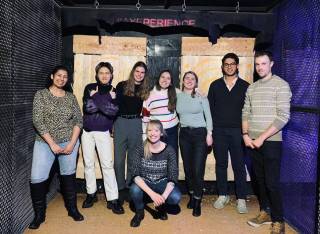Biography
Dr. Laura K. Donovan is a research paediatric neuro-oncologist, specialising in mouse modelling, immuno-oncology, molecular medicine, and functional genomics. Her primary mission is to pave the way for groundbreaking therapies targeted at paediatric medulloblastomas. With expertise in immunogenomics, she leads the discovery of candidate targets and the creation of preclinical models that facilitate the direct translation of discoveries into clinical therapies.
Dr. Donovan's career trajectory includes a role as a Fellow at The Hospital for Sick Children in Toronto, Canada. As a Young Investigator within the SU2C-St. Baldrick's Foundation Immunogenomics Paediatric Dream Team, she played a pioneering role in introducing Chimeric Antigen Receptor T-cell therapies for the effective treatment of paediatric cerebellar brain tumours. This groundbreaking work resulted in several notable discoveries, including the development of innovative locoregional therapeutic delivery methods for medulloblastomas and ependymomas, documented in Nature Medicine in 2020. Her journey also led to the initiation of a groundbreaking first-in-child clinical trial aimed at posterior fossa A ependymomas, as indicated by NCT02442297.
In addition, Dr. Donovan co-spearheaded additional studies focused on profiling the single-cell transcriptomes of paediatric medulloblastomas and ependymomas. These investigations have led to a more profound understanding of the tumour-immune microenvironment and the origins of childhood cerebellar tumours, a significant breakthrough documented in Nature in 2019. Her remarkable accomplishments have earned her several prestigious awards, including 'The Society of International Pediatric Oncology (SIOP) Young Investigator of the Year in 2020,' the 'Society for Immunotherapy of Cancer (SITC) - Akoya Spatial Phenotyping Award in 2021,' the 'American Association for Cancer Research (AACR) Team Science Award in 2021,' and the 'ReMISSION Alliance Science Award in 2023.'
Laura is actively engaged in various academic roles and affiliations, underscoring her commitment to advancing research in her field. She is an integral member of the ITCC Brain Tumour Committee and Medulloblastoma Working Group, the INSTINCT-MB consortium, and the ReMISSION Alliance. She holds guest editorial positions and contributes as an active reviewer. Furthermore, she serves as a valuable member of the CRUK Clinical Trials Expert Review Panel and the CCLG Research Advisory Group, reflecting her dedication to fostering progress in the field of paediatric neuro-oncology.
Research
As a Lecturer in Paediatric Neuro-oncology at UCL GOS-ICH, Laura's research program is dedicated to enhancing the survival outcomes of paediatric patients with recurrent medulloblastoma. This is achieved through a multifaceted approach, involving the discovery of functional- and immuno-genomics, combined with spatial phenotypic and transcriptomic analyses, and the translation of immune biology, and into innovative therapeutic strategies. These strategies are designed to be used with optimal and clinically relevant immune competent genetically engineered animal models. The ultimate aim of this research program is to unlock the full clinical potential of modern therapies for recurrent paediatric medulloblastoma, thereby improving the prognosis for these young patients.
Laura's research program is generously supported by several organisations, including Great Ormond Street Children's Charity, Stand Up 2 Cancer-Cancer Research UK (SU2C-CRUK), Great Ormond Street Hospital-National Institute for Health Research (GOSH-NIHR), Little Princess Trust, Children with Cancer UK, Fight Kids Cancer, and Children's Cancer and Leukaemia Group. These collaborations and funding sources play a pivotal role in advancing research that holds the promise of making a significant impact on the lives of children affected by medulloblastoma.
Research Projects:
- Overcoming tumour heterogeneity with next generation CAR T-cells for the effective treatment of paediatric medulloblastoma
- Decoupling epigenetic vulnerabilites of recurrent medulloblastoma
- Epigenetic silencing to stimulate CAR T-cell persistency in paediatric medulloblastoma
- Dual targeting of childhood medulloblastoma and high grade glioma
- Immune priming and immunotherapy for the treatment of childhood brain tumours.
- Decoupling clonal evolution of relapsed paediatric brain tumours
- Novel combination therapies for high-risk paediatric brain tumours
 Close
Close



